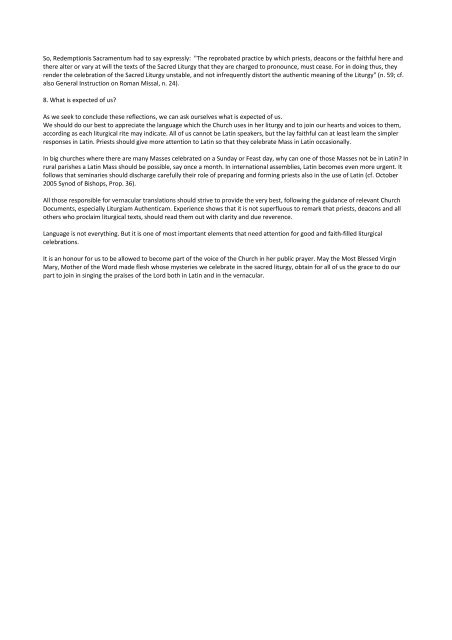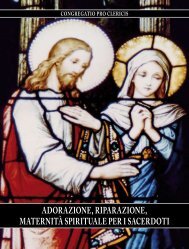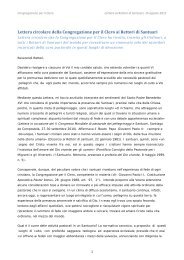Pope Bene<strong>di</strong>ct XVI, in his Message to the meeting of the "Vox Clara" English Committee on 9 November 2005, speaks of translationswhich "will succeed in transmitting the treasures of the faith and the liturgical tra<strong>di</strong>tion in the specific context of a devout andreverent Eucharistic celebration" (in Notitiae, 471‐472, Nov.‐Dec. 2005, p. 557).Many liturgical texts are steeped in biblical expressions, signs and symbols. They resonate with prayer patterns that date back tothe Psalms. The translator cannot afford to ignore this.A language spoken by millions of people today will undoubtedly have many shades and variations. There is a <strong>di</strong>fference betweenEnglish used in the Constitution of a country, that spoken by the President of a Republic, the conversational language of dockworkers or students and the conversation between parents and children. The manner of expression cannot be expected to be thesame in all these situations, although all are using English.What form should liturgical translations adopt? No doubt liturgical vernacular should be intelligible and easy to proclaim and tounderstand. At the same time, it should be <strong>di</strong>gnified, sober, stable and not subject to frequent change. It should not hesitate to usesome words not generally in use in everyday conversation, or words that are associated with Catholic faith and worship. Therefore,it should say chalice and not just cup, paten and not plate, ciborium and not vessel, priest and not presider, sacred host and notconsecrated bread, vestments and not dress.Therefore, Liturgiam Authenticam says: "While the translation must transmit the perennial treasury of orations by means oflanguage understandable in the cultural context for which it is intended,... it should cause no surprise that such language <strong>di</strong>fferssomewhat from or<strong>di</strong>nary speech" (n. 47).Intelligibility should not be pushed to mean that every word must be understood by everybody at once. Just look carefully at theCredo. It is a "symbol", a solemn summary statement, on our faith. The Church has had to call some General Councils for an exactarticulation of some articles of our faith.Not every Catholic at Mass will imme<strong>di</strong>ately understand in full such normal Catholic liturgical formulae as Incarnation, Creation,Passion, Resurrection, Consubstantial with the Father, Procee<strong>di</strong>ng from the Father and the Son, Transubstantiation, Real Presence,Transcendent and omnipotent God. This is not a question of English, or French, or Italian, or Hin<strong>di</strong> or Kiswahili. Translators shouldnot become iconoclasts who destroy and damage as they go along. Everything cannot be explained during the liturgy.The liturgy does not exhaust the entire life activity of the Church (cf. SC, n. 9). There is also need for theology, catechetics andpreaching. And even when a good catechesis has been delivered, a mystery of our faith remains a mystery.Indeed, we can say that the most important thing in <strong>di</strong>vine worship is not that we understand every word or concept. No. The mostimportant consideration is that we stand in reverence and awe before God, that we adore, praise and thank him. The sacred, thethings of God, are best approached with sandals off.In prayer, language is primarily for contact with God. No doubt, language is also for intelligible communication between us humans.But contact with God has priority. In the mystic, such contact with God approaches and sometimes reaches the ineffable, themystical silence where language ceases.There is therefore no surprise if liturgical language <strong>di</strong>ffers somewhat from our everyday language. Liturgical language strives toexpress Christian prayer where the mysteries of Christ are celebrated.As if putting together these various elements needed in order to produce good liturgical translations, let us quote from the Addressof Pope John Paul II to American Bishops from California, Nevada and Hawaii during their 1993 ad limina visit to Rome. He wasasking them in translations to guard the full doctrinal integrity and beauty of the original texts:"One of your responsibilities in this regard is to make available exact and appropriate translations of the official liturgical books sothat, following the required review and confirmation by the Holy See, they may be an instrument and guarantee of a genuinesharing in the mystery of Christ and the Church: lex oran<strong>di</strong>, lex creden<strong>di</strong>. The arduous task of translation must guard the fulldoctrinal integrity and, accor<strong>di</strong>ng to the genius of each language, the beauty of the original texts. When so many people arethirsting for the Living God ‐ whose majesty and mercy are at the heart of liturgical prayer ‐, the Church must respond with alanguage of praise and worship which fosters respect and gratitude for God's greatness, compassion and power. When the faithfulgather to celebrate the work of our Redemption, the language of their prayer ‐ free from doctrinal ambiguity and ideologicalinfluence ‐ should foster the <strong>di</strong>gnity and beauty of the celebration itself, while faithfully expressing the Church's faith and unity" (inInsegnamenti of John Paul II, XVI, 2, 1993, p. 1399‐1400).From the above considerations, it follows that the Church needs to exercise careful authority over liturgical translations. Theresponsibility for the translation of texts rests on the Bishops' Conference, which submits them to the Holy See for the necessaryrecognitio (cf, SC, n. 36; C.I.C., can. 838; Lit. Authenticam, n. 80).It follows that no in<strong>di</strong>vidual, even a priest or deacon, has authority to change the approved wor<strong>di</strong>ng in the sacred liturgy. This is alsocommon sense. But sometimes we notice that common sense is not very common.
So, Redemptionis Sacramentum had to say expressly: "The reprobated practice by which priests, deacons or the faithful here andthere alter or vary at will the texts of the Sacred Liturgy that they are charged to pronounce, must cease. For in doing thus, theyrender the celebration of the Sacred Liturgy unstable, and not infrequently <strong>di</strong>stort the authentic meaning of the Liturgy" (n. 59; cf.also General Instruction on Roman Missal, n. 24).8. What is expected of us?As we seek to conclude these reflections, we can ask ourselves what is expected of us.We should do our best to appreciate the language which the Church uses in her liturgy and to join our hearts and voices to them,accor<strong>di</strong>ng as each liturgical rite may in<strong>di</strong>cate. All of us cannot be <strong>La</strong>tin speakers, but the lay faithful can at least learn the simplerresponses in <strong>La</strong>tin. Priests should give more attention to <strong>La</strong>tin so that they celebrate Mass in <strong>La</strong>tin occasionally.In big churches where there are many Masses celebrated on a Sunday or Feast day, why can one of those Masses not be in <strong>La</strong>tin? Inrural parishes a <strong>La</strong>tin Mass should be possible, say once a month. In international assemblies, <strong>La</strong>tin becomes even more urgent. Itfollows that seminaries should <strong>di</strong>scharge carefully their role of preparing and forming priests also in the use of <strong>La</strong>tin (cf. October2005 Synod of Bishops, Prop. 36).All those responsible for vernacular translations should strive to provide the very best, following the guidance of relevant ChurchDocuments, especially Liturgiam Authenticam. Experience shows that it is not superfluous to remark that priests, deacons and allothers who proclaim liturgical texts, should read them out with clarity and due reverence.<strong>La</strong>nguage is not everything. But it is one of most important elements that need attention for good and faith‐filled liturgicalcelebrations.It is an honour for us to be allowed to become part of the voice of the Church in her public prayer. May the Most Blessed VirginMary, Mother of the Word made flesh whose mysteries we celebrate in the sacred liturgy, obtain for all of us the grace to do ourpart to join in singing the praises of the Lord both in <strong>La</strong>tin and in the vernacular.








